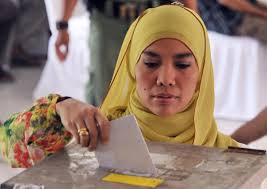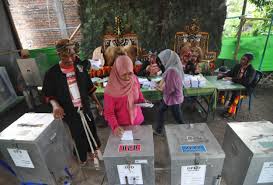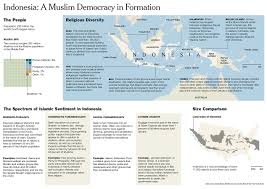
Dr. Nikolaos van Dam
THE HAGUE

Dr. Nikolaos van Dam
WHEN I was contemplating which thoughts I would like to share with you today, I posed myself the hypothetical question what we would think if a similar conference were to be held in Jakarta, for instance by the Muhammadiyah, one of the biggest Indonesian Muslim organizations, with as topic: “Are Christianity and democracy compatible?” Wouldn’t we be somewhat surprised if Indonesians would ask themselves whether Christianity and democracy are compatible, taking Europe as an example? We would probably react by thinking that it is so obvious that Christianity and democracy do go well together in Europe, that we do not need any academic discussion to prove it, let alone by non-European Muslim “outsiders”. Actually, we might in this case probably not even bring up the issue of religion, because we would think that it goes without saying that democracies are flourishing in the Western world, of which Europe is a part, irrespective of whether there are secular or religious inspired governments. But is it really that obvious if we look at European history? After all, didn’t we have the most ugly dictatorships in Europe in countries with populations that at the time could really be considered as having a majority of devote Christians? Aren’t the eras of Hitler in Germany, Mussolini in Italy and General Franco in Spain clear examples that also Christianity (or being a Christian) and dictatorship can go well together? After all, these are examples in which big parts of Christian populations in Europe enthusiastically supported their dictatorial leaders, which led to millions of dead.
If I would say on basis of these experiences that Christianity and democracy are actually incompatible, I would almost certainly be ridiculed, because it will, rightly, be considered as nonsense. After all, most of Europe is now democratic, and the big majority is still Christian. That should be proof enough in itself, wouldn’t it? We would not need to study the Bible or other Christian texts to convince us of the thesis that democracy and Christianity (or being a Christian) are compatible.
Following the same logic, we do not have to study the Qur’an or other Islamic texts to convince us of the fact that Islam and democracy go well together, as is illustrated by countries with a Muslim majority which have democracies, like for instance Indonesia (with more than 205 million Muslims), Pakistan (178 million), Bangladesh (148 million) and Turkey (75 million), or a democracy with a very sizable Muslim population like India (which with its 177 million Muslim inhabitants almost equals Pakistan in this respect, and actually is the third largest country in the world as to the number of Muslim inhabitants after Indonesia and Pakistan). Indonesia also happens to be the third largest democracy in the world, after the United States and India.
To put it differently: there are various Islamic countries with a democratic political system, just as there are various predominantly Muslim countries that have a dictatorship. The same applies to non-Muslim countries: some are democracies; others are dictatorships, irrespective of the religions prevalent amongst its rulers or people. To me this just indicates that Islam and democracy, or being simultaneously a Muslim and democrat, can go very well together, just as the opposite may be the case. The same applies to countries with people having another religion, such as Christianity. Therefore one might draw as a main conclusion that in practice there is no specific link here between religion and either democracy or dictatorship.
To take a different, related question: is the Christian West (if we can call it Christian) democratically inclined when it comes to Islam?
We have seen various examples where Western countries have called upon the Palestinians to have free and democratic elections. When the result was a victory of the Islamic Resistance Organization Hamas, however, Western countries boycotted the results and generally refused contacts with the new Hamas local government, because of its position towards Israel. Something similar happened with the Islamic Salvation Front (FIS) in Algeria when it won the elections there. Their victory was rejected by the Algerian military, and this rejection was generally supported in the West.
From previous experiences the conclusion can be drawn that politicians in the West generally do indeed want to see democracy and democratic elections in the Islamic world, albeit that when the victorious parties happen to be predominantly Islamic oriented, they are not only not enthusiastic about the outcome but they sometimes even tend to reject the results, because that is not something they generally expected or wanted. One of the reasons for this rejection is the expectation that the Islamic forces that come to power through a democratic system, may turn out to misuse the same system so as to later impose their rule undemocratically. This, in turn, is based on the presumption that Islam and democracy are not really compatible. In some cases the expectations of misusing the democratic system may be quite justified, like recently in Egypt, but in other cases, like Indonesia, they are unfounded.
It just depends on which Islamic oriented group one takes as an example and to which period of time one refers. Some Islamic groups are at present clearly democratically oriented, like for instance the biggest Muslim organizations in Indonesia like the Muhammadiyah and the Nahdhatul Ulema that represent a very large part of the Indonesian Muslim population, whereas other, much smaller movements like the Jemaah Islamiyah or the Hizb al-Tahrir are undemocratically oriented. They want to use or misuse the democratic system to achieve their undemocratic aims, or they even reject democratic politics and the nation state.
The Muhammadiyah and the Nahdhatul Ulema are unique in the sense that nowhere else in the Islamic world can we find such big Islamic organizations. They are at present a stabilizing force helping the further democratic transformation of the country.
These parties today represent what in the past has been called “the smiling face of Indonesian Islam”, albeit that this expression also hides less pleasant factors, such as the mass killings of alleged communists during 1965-1966 that were orchestrated by Suharto’s military and were largely carried out by killing squads recruited from the main Muslim organizations. Fortunately, times have strongly changed in the positive sense. Change, however, is not always going into one direction. There have been shifts within the Muhammadiyah and Nahdhatal Ulema from liberal and progressive to more fundamentally conservative, and it is only natural that such large organizations are not homogeneous, but contain a variety of opinion.
I consider it a good phenomenon that we want to know much more about Indonesia and the Indonesians, while welcoming at the same time if Indonesians would want to know much more about the Netherlands and Europe.
Actually, one should have expected the Dutch to be already well informed about Indonesia and Islam. Unfortunately, however, we are not that well informed at all, not to say that bigger parts of the Dutch population are quite ignorant of Indonesia, its people and its rich cultures, just as they are generally not that well informed about Islam. This is because education about Indonesia and Islam is quite minimal, if not to say inadequate. People are, unfortunately, not born with knowledge, like some bird species are, but have to obtain it during their lives through study, education, experience and their surroundings. Public education unfortunately does not really provide it. The idea that it might be a moral obligation to be at least better informed about one’s own colonial history – with both its negative and positive sides – apparently hardly finds any positive response in the Netherlands.
Who does still remember today that the Kingdom of the Netherlands once upon a time had the biggest number of Muslim citizens in the world, because of its colonies in what today is the Republic of Indonesia? And who remembers that the Consulate of the Kingdom of the Netherlands in Jeddah (which is now closed) was one of the most important consulates in the world because of the numerous Hajj pilgrims of the Dutch Indies who had to pass through this city on their way to Mecca? With this background in mind it was only logical that Islam was seriously studied by Dutch scholars; and that many of their Islamic studies were related to the situation in the Dutch Indies. Some of the best libraries on the subject were established in the Netherlands and many of the studies that were carried out by Dutch scholars at that time are still valuable today. The libraries and materials are still there, but the number of scholars dealing with Indonesia has drastically declined. So has the interest among students. Nevertheless, interest in Islamic studies is still very vivid, albeit that the motivations have shifted and have become quite different.
One would have expected that the Kingdom of Netherlands of today, being formerly the state with the biggest number of Muslim citizens in the world, would be populated by people having a special awareness, sensitivity, experience and knowledge about Islam. But this is not the case, and probably never has been so. Two of the reasons for this are that the people of Indonesian origin living in the Netherlands are almost exclusively Christians, and that the Dutch in the Indonesian Archipelago generally were not very close with the Muslim communities there, for fear of Islamic opposition and hostility towards Dutch colonialism.
This attitude is reflected in the collections of today’s Dutch museums. In the Royal Tropical Institute in Amsterdam a lot is exhibited about Indonesian minorities like the Bataks, Dayaks, Papuas, and so on; but hardly anything can be found on the Muslim majority. And this is no coincidence; it was on purpose, because in the past special public attention to the Muslim population was avoided in exhibitions.
I have been following developments in the Islamic and Arab world half a century now, and for most of that time I never felt bothered by the question of whether or not Islam was compatible with democracy. To me it was not really a theme that I considered to be relevant.
On the contrary: I considered it to be a kind of non-issue, and to a certain extent I still do. Except for the fact that many people, particularly in the West, have in the meantime started to consider it to be of essential importance. Therefore it has become a controversial question, which can no longer be fully ignored. Not that it is always a realistic one based on actual facts. In a way, it tells more about the attitude of those who imagine Islam and democracy to be incompatible than about the realities in the Islamic world.
Does Islam adapt itself to society or does society adapt itself to Islam?
Some describe Indonesia as an Islamic country, although there are many people with other religions living here. These constitute some 10% of the population, making up some 24 million people. In 2009 not less than 10 of the 33 Provinces in Indonesia had a non-Muslim Governor. Instead of calling Indonesia an Islamic country, it is more appropriate to describe it as “the country with the biggest Muslim population of the world”. Different from what some Western observers tend to suggest, Indonesia’s official state ideology, the Pancasila, is not really secular, because its first principle is the “belief in One God”. There is no strict separation between religion and state, and since the Indonesian state with its Pancasila ideology “is already Islamic enough”, there is, as Professor Azyumardi Azra has pointed out, “no strong reason for mainstream Muslims to transform Indonesia into an Islamic state”. At the same time the principle of “unity in diversity” is to be respected. It is even the slogan in the national weapon: “Bhinneka Tunggal Ika”.
It should be added here that many of the more purist Muslims have in the course of time rejected the Pancasila. They wanted to give a constitutional status to the Shari’ah, at least during the discussions on the Jakarta Charter, as the preamble to the 1945 Constitution was called. But they failed, and the Pancasila was succesfully imposed from above, which, in turn, strengthened Indonesia’s unity in diversity. By way of an exception in the Islamic world, Islam in Indonesia was not placed above other officially recognized religions but was allocated a place side by side with Catholicism, Protestantism, Hinduism and Buddhism.
In 2005 the Majelis Ulama Indonesia (MUI, Indonesian Council of Islamic Scholars) issued a fatwa (religious opinion) declaring secularism, pluralism and religious liberalism to be incompatible with Islam. Fatwas like these were also an attack against the thought of prominent liberal reformers like Abdarrahman Wahid (later Indonesian president) and Nurcholish Majid. Many Muslims did, however, protest against the fatwas of the Majelis Ulema Indonesia, including the former chairmen of the Muhammadiyah and the Nahdhatul Ulema.
Respect for unity in diversity is clearly reflected in a special phenomenon in Indonesia, which I did not come across in any Arab Islamic country, and that is the greeting of different religious communities with their respective greeting formulas, even if one does not belong to one of these communities. When addressing a Muslim audience it is fully accepted in Indonesia to start with the Islamic greeting of “assalamu ‘alaikum wa rahmatullahi wa barakatuh”, also by non-Muslims (although not all Muslims appreciate this); when addressing Christians in for instance Manado, a Muslim, on the other hand, might start with “shalom”, and in Bali the Buddhist greetings might be used. It is, however, appropriate to, after a religious formula, always add the more general and religiously neutral formula of: “Salam sejahtera bagi kita semua”, so as not to exclude anyone in the audience from being addressed.
 Some have noted that “the Islam” does not really exist, because there are so many forms of Islam. I would argue, rather, that although Islam does have so many varieties and whereas there is such a rich diversity in Islamic communities, this does not exclude “the Islam” from existing. It merely means that there are different interpretations of it. Certain basic principles of Islam are, however, the same everywhere. What is different are the regional and cultural diversities among Islamic communities.
Some have noted that “the Islam” does not really exist, because there are so many forms of Islam. I would argue, rather, that although Islam does have so many varieties and whereas there is such a rich diversity in Islamic communities, this does not exclude “the Islam” from existing. It merely means that there are different interpretations of it. Certain basic principles of Islam are, however, the same everywhere. What is different are the regional and cultural diversities among Islamic communities.
Islam emanated in a specific Arabian social and cultural environment, existing in the Arabian Peninsula at the time of the Prophet Muhammad. It is only natural, therefore, that the original Islam contains many Arab specifics. Although Islam can be said to be a universalistic religion, it can also be said that it started as an Arab religion, revealed in the Arabic language. This language is so much part of Islam, that it is considered inappropriate to do the ritual prayer (Salat) in any other language than Arabic. An Indonesian religious leader who led the ritual prayers in Indonesian was imprisoned for this one day in the past.
When Islam spread outside the Arabian Peninsula and came into contact with other cultures, Islam adapted itself to these regions in the sense that various local habits and traditions where not only being accepted as not contradicting those of Islam, but were later on also sometimes interpreted by the local populations as being in line with Islam, if not Islamic itself. Many people who as new Muslims continued part of their former traditions, gradually came to argue that these traditions were in fact part of Islam. In the traditional West Sumatra Minangkabau society, for instance, Minang culture is said to be based on Islam: “culture based on religion, which in turn is being based on the Qur’an”. One might, however, also say that Islam has merged here to a large extent with local culture, because Islamic religion and Adat are in this region perceived to be almost identical. A remarkable aspect of Minang society is that, different from Arab Islamic custom, it has a matriarchal system. There is nothing which prevents the Minang from being both devote Muslims and having a matriarchal system.
More generally, one might say that in large parts of Indonesia Islam has adapted itself to the local cultures and traditions, or has embedded itself into them, instead of fully adapting to the culture and traditions of the Arabian Peninsula the other way around. A similar phenomenon could be said to have taken place in other regions of what today is considered to be the Islamic world outside the Arabian Peninsula.
The aspect of peaceful coexistence of Indonesian cultures, traditions and Islam has been formulated most clearly, if not bluntly, by one of the most prominent members and thinkers of the Liberal Islamic Network (JIL: Jaringan Islam Liberal) the Indonesian Ulil Abshar-Abdallah in 2002, and I quote here from Martin van Bruinessen’s article “What happened to the smiling face of Indonesian Islam?”:
“I consider Islam as a living organism”, Ulil began his declaration, “and not as a dead monument erected in the seventh century…” There is a strong tendency these days to treat Islam as a monument, petrified and immutable, and it is time to challenge that attitude. We need interpretations that are non-literal, substantive, contextual and consonant with the heartbeat of a human civilization that is ever-changing. The substance of Islam should be separated from the culture of the Arabian peninsula, and it is that universal substance that has to be interpreted in accordance with the local cultural context. Whipping, stoning and the cutting of hands, the jilbab (full female covering) and beard are Arab cultural peculiarities and there is no reason why other Muslims should follow them.”
It is not surprising that Ulil’s remarks caused great controversy, even though many well-educated Muslims in Indonesia may share his views. Some orthodox Muslims even wanted him to be sentenced to death.
Indeed, by far not all Indonesian Muslims accept the local cultural and syncretic mystical elements as part of Islam. Some of the more orthodox Muslims tend to strongly reject them as unislamic. And although abangan, or Javanese syncretic oriented Muslims, do not enjoy formal recognition, most of them feel that the Pancasila protects them from santri (or more orthodox) pressure to conform to formal Islam. Tensions between more and less orthodox Muslims have existed throughout history and are bound to remain, varying in intensity from time to time, and making change always a possibility in one direction or another.
I would like to give a few practical examples, typical for Islamic tolerance in Indonesia:
– The Ramayana is a very popular epic in Indonesia, Java in particular. When I saw this dance performed in Yogyakarta for the first time, I asked what the religion of the dancers was. The reply was that they were all Muslims. I was amazed because I considered the Ramayana performance to be Hindu, and therefore was surprised that such a dance related to another religion could be performed by Muslims. A friend of mine, who had studied Indonesia for a long time, explained, however, that the Ramayana should in this case not be considered as a Hindu dance, but rather as a performance which was an expression of Indonesian or Javanese culture. Therefore culture was the key concept here, not religion.
– Something similar is the case when you look at many of the Javanese mosques. As has been described by Prof. Pijper in his well-known study on the mosques of Java, the roof or roofs of the typically Javanese mosques consist of various layers, the forms of which go back to Hindu-Javanese times, and may symbolize various heavens. These have nothing to do with Islam, but rather with the heavens existing in Hinduism. Here, again, the present shape has nothing to do with Hindu religion, but is rather a residue of Hindu culture in Java.
– Whereas in many other countries with Islamic majorities the use of Arabic Islamic names is very popular, in Indonesia, Java in particular, it is more common to frequently use traditional Javanese names. For that reason it is often not possible to know someone’s religious identity. But the ethnic and cultural background is often easily recognized. It is another example of the fact that traditional culture is given a prominent place in Indonesian society.
– Quite particular is also the performing by women of Qur’an recitals during opening ceremonies of important gatherings. In other Islamic or Arab countries I have never noticed such a phenomenon. It simply is an Indonesian tradition that reflects more the position of women in society than religion itself. Indonesia’s feminist movement is most dynamic and diverse.
When turning to the elections in Indonesia, one can note that the religious parties do not dominate the political scene, even if they theoretically could. During the legislative elections of April 2014 the Islamic-based parties had an impressive 32 percent of the total votes, enough to put forward their own presidential candidate. This prompted a number of prominent clerics from a wide range of Muslim organizations, including Professor Din Syamsuddin, the chairman of the Indonesian Council of Ulema (MUI), to call for a coalition in an effort to indeed put forward their own presidential candidate for the presidential elections next July. Nothing came of it, however, because Islamic-based parties prefer to pragmatically cooperate with secular nationalist parties in order to obtain positions of political power, preferably in government, that offer more benefits than being in the formal parliamentary opposition. Political pragmatism prevails among the Islamic-based parties, as has been the case during earlier elections.
To make a long story short: Islam and democracy, or being simultaneously a Muslim and democrat, are fully compatible in Indonesia, as well as in quite a number of other countries with a Muslim majority. This being said, I should add that the perpetuation of democracy is not something that should be taken for granted, neither in Indonesia nor anywhere elsewhere in the world.
* Dr. Nikolaos van Dam was ambassador of The Netherlands to Indonesia, Germany, Turkey, Egypt and Iraq (1988-2010). He is the author of The Struggle for Political Power in Syria (London: I.B. Tauris, 2011, 4th edition).
References:
Martin van Bruinessen, What happened to the smiling face of Indonesian Islam?, RSIS Working Paper No. 222, Singapore, 2011, p. 1; 3; 41-42.
Azyumardi Azra, ‘Indonesian Islam, Mainstream Muslims and Politics’, in: Umar Hadi, Abdul Mu’ti, et.al, Islam in Indonesia, Jakarta, 2009.
Martin van Bruinessen, ‘Islamic state or state Islam? Fifty years of state-Islam relations in Indonesia’, in: Ingrid Wessel (ed.), Indonesien am Ende des 20. Jahrhunderts, Hamburg: Abera-Verlag, 1996, p. 19-34.
Martin van Bruinessen, ‘Indonesian Muslims and Their Place in the Larger World of Islam’, in: Anthony Reid (ed.), Indonesia rising: the repositioning of Asia’s third giant, Singapore: ISEAS, 2012, pp. 117-140.
— Delivered at the Round Table Conference Indonesia Nederland Society, The Hague, Senate Building, 25 June 2014

http://www.bahasakita.com/islam-democracy-indonesia/



















